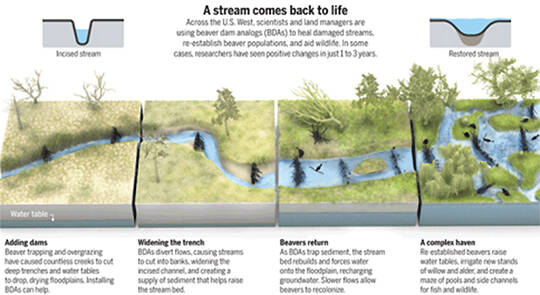The Bainbridge Island City Council will receive a presentation on local beaver activity and also reports for city advisory committees regarding Climate Change, Utilities, Ethics and Environmental Technology at its meeting at City Hall and on Zoom at 6 p.m. April 16.
City manager Blair King says in his weekly newsletter that in all his years in government he’s never talked about beavers before.
“City Councils have discussed dogs, cats, chickens, birds, squirrels and circus elephants,” but not the “dam-building, flat-tailed, semi-aquatic rodent beavers.”
Brittany Gordan, Kitsap County’s Natural Resource coordinator, will talk about how beavers help with groundwater recharge, carbon sequestration, surface water storage and improve riparian habitat. Beavers also help prevent wildfire spread. The positive aspects of beavers will be discussed along with the management of beavers and minimizing the conflicts between beavers, infrastructure and fisheries.
A quirky incident involving beavers and habitat restoration occurred recently as part of the state Department of Transportation’s Murden Creek Fish Barrier Removal Project on BI, King’s newsletter says. The project was nearly complete, and the engineers were waiting for a large flush of water to help naturally disperse gravel and sand. One day, a large volume of water flushed underneath the new bridge, but it had not rained. But apparently, a beaver dam had formed upstream. The dam gave way and water in the reservoir created the first flush the project had been waiting for.
Gordan’s presentation says Kitsap streams are abundant but vulnerable to climate change, drought, water consumption, flooding, runoff, development and pollution. Impervious surfaces need to be limited, and stormwater and wastewater managed responsibly as a result. Aquifers need to be recharged and water consumption managed since groundwater is so important.
Science shows beaver dams, ponds and habitat provide ecosystem services such as: carbon sequestration; channel steepness reduction; surface water storage that reduces flooding and releases water slowly during drought; restores natural hydrology by reducing velocity during storms; increases stream flows during drought; reconnects surface and groundwater; and improves riparian habitat and water quality. Benefits of beavers include: recharge groundwater; filter pollutants and sediments; provides stream flow for early returning salmon; provide rearing habitat for juvenile salmon; and create habitat for wildlife.
Beaver populations are increasing as they are re-colonizing habitat that has been vacant for decades. When they are too close to development there can be problems such as flooding. Beavers also can cause problems for fish as their dams can inhibit swimming upstream. Managing beavers requires trapping, fencing, relocating problem infrastructure and removing parts of dams to maintain water levels, the presentation concludes.
As for the advisory committee reports:
Climate change priorities for this year include: Community Heath Pump Installation Program; feedback on Winslow and Comp plans; support Electric Vehicle chargers; update Greenhouse Gas emissions; and support BI Environmental and Electrification Expo.
Utilities priorities are: Winslow water tank improvements; sewer system improvements such as reuse and adopting fats, oils and grease pre-treatment law; and stormwater system such as management plans and solid waste management.
Ethics priorities include: make sure city staff gets ethics training; update code; answer council questions; increase public exposure to program; and respond to complaints.
Environmental technical priorities are: groundwater management plan; shoreline master plan; Winslow and Comp plans; wastewater reuse; habitat management plan; review Suzuki development plans; and support planning department.



